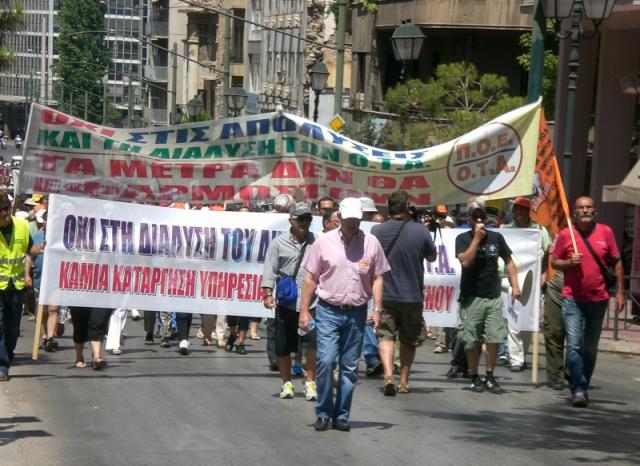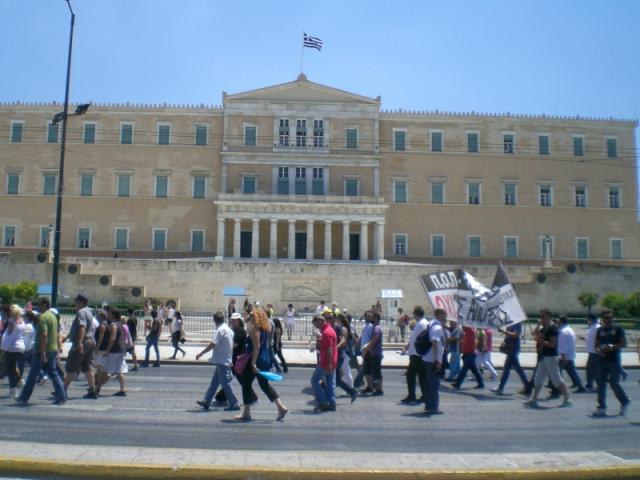The municipal services in Greece have remained closed for the second day in a row because of the strike of the union of employees in local government organizations ПОЕ-ОТА. Earlier this week, the government had announced that it would close the municipal police. It employs 3,600 people whose main duty is to write parking tickets.
The employees are firmly refusing to obey the government plan and threatening with mass strikes. GRReporter had sought representatives of the municipal services to comment on the situation. On Tuesday morning, dozens of victims had gathered outside the offices of the department, awaiting the decision of the union body regarding their future actions.
We requested a meeting with a representative of the union of municipal police officers to present the viewpoint of the people who could be unemployed from next month onwards. Instead of a brief statement describing the problem, we were rudely told, "Get out of here. We are busy!"
It should be noted that this is the first time that we have been faced with such an attitude since 2009 when the mass cuts in Greece had started. Our experience related to dozens of protests of various professional and social groups suggests that the people who are threatened by the crisis want to be heard. However, this obviously does not apply to municipal police officers in Athens.
An unemployed citizen commented later on the scene, "Do not expect that municipal police officers will behave otherwise. The majority of these people have been appointed to this position because they know someone or due to some other type of preferential attitude. They believe that the changes in Greece cannot affect them and therefore still refuse to accept the reality in the country."
The truth is that the majority of the persons who have been appointed in recent years have passed exams to become municipal police officers, but this is not true for everyone. The only duty of this position is writing parking tickets. The employees are not allowed to carry weapons or to draw up a statement against someone for exceeding the speed limits or for violating the traffic rules.
Two hours later, after the union of the municipal police officers joined the protest of the employees in local government organizations, we found the deputy chairman of the union of municipal police officers Thanos Tatsis for a comment.
 After giving a vague explanation for his behaviour earlier in the day, he said, "It is impossible for the municipal police to be closed by some brainless people from the supervisory Troika or the government. We want the government to ensure that the police will take over the total number of the employees in the municipal police service. We will not accept any other terms."
After giving a vague explanation for his behaviour earlier in the day, he said, "It is impossible for the municipal police to be closed by some brainless people from the supervisory Troika or the government. We want the government to ensure that the police will take over the total number of the employees in the municipal police service. We will not accept any other terms."
Tatsis stressed that the municipal police officers had 28 duties in total in addition to writing parking tickets but did not elaborate on them.
The government is planning to shut down the municipal police considering it as an inefficient service. Its employees must be included in the mobility programme by September. After an evaluation of their skills, one third of them will undergo further training and will be transferred to the traffic police department of the Ministry of Civil Protection. Another 5% to 10% of them will remain on staff in municipalities but will hold different positions.
The closure of the municipal police service is not facing the strong resistance of the general public. However, the situation regarding other planned horizontal cuts such as the layoffs of school guards is different.
The mobility programme of the new Minister of Administrative Reform Kyriakos Mitsotakis provides for the dismissal of 2,200 school guards by the end of July. "Let them tell us why they believe that the guards are not fulfilling their professional and civic duty," urged Themis Balasopoulos, chairman of the union of municipal workers ПОЕ-ОТА.
The Ministry of Public Administration responded that the municipalities had not submitted lists of the evaluation of the skills of their staff and the government was forced to cut whole departments of the local government organizations.
"Before they start laying off ordinary guards in school yards, they should reassess the employees in the parliament whose number reaches 1,500", said one of the protesters in front of the Ministry.
The changes in the government administration have given rise to a new wave of strikes. The government plans are focusing mainly on the reduction of the staff of municipalities and mayoralties at present. Some union leaders in the sector state that they are an easy source of mass dismissals without actually improving the performance of the public administration.
According to a representative of the trade union of the municipality of Athens, the strikes will have no effect. The cuts will be implemented in the name of the next tranche of the financial aid but the public administration will not improve. ПОЕ-ОТА has announced that the strike will continue on Wednesday, 10 July. The municipal police officers state that they will not return to work until the government withdraws the bill providing for their dismissal.
